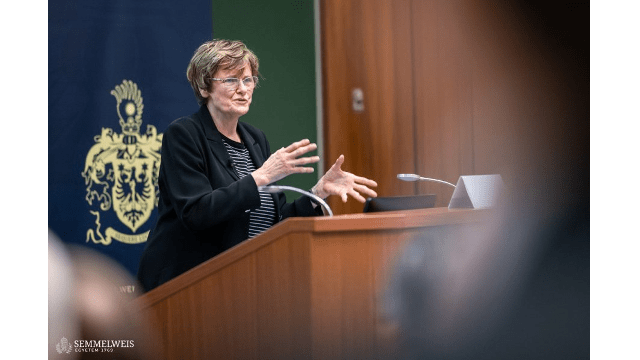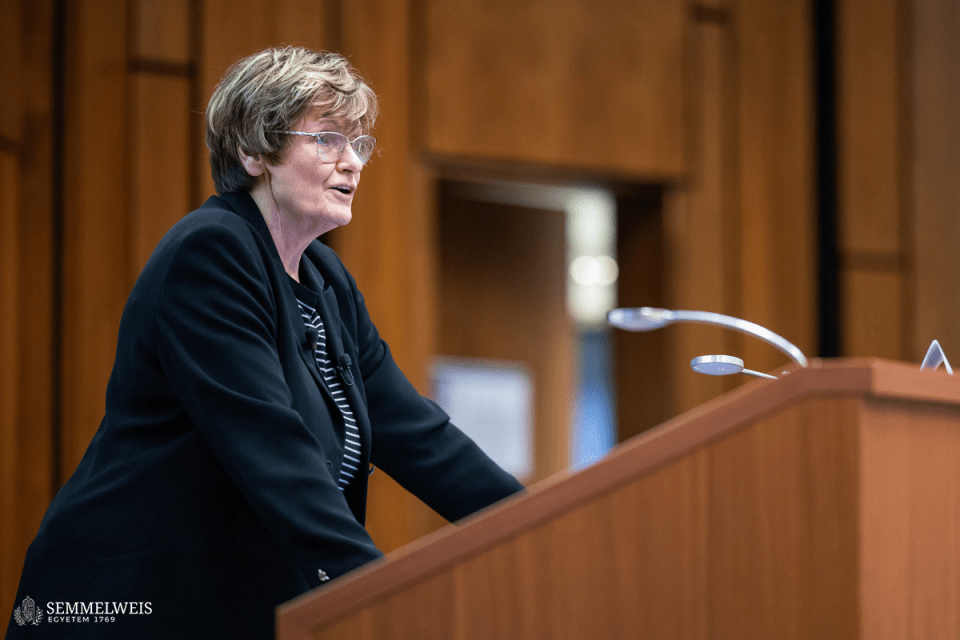DR. KATALIN KARIKÓ: NO MATTER WHAT TASK YOU GET, YOU DIG INTO IT AND YOU ALWAYS LEARN SOMETHING, THAT’S THE POINT
Working for our own pleasure, lots of learning, perseverance, stress management and a sense of gratitude even to those who hinder us from achieving our goals – these are among the main messages of the keynote speech by Dr. Katalin Karikó, Nobel Prize-winning scientist, delivered at the Frigyes Korányi Scientific Forum of Semmelweis University at the Basic Medical Science Center (EOK).
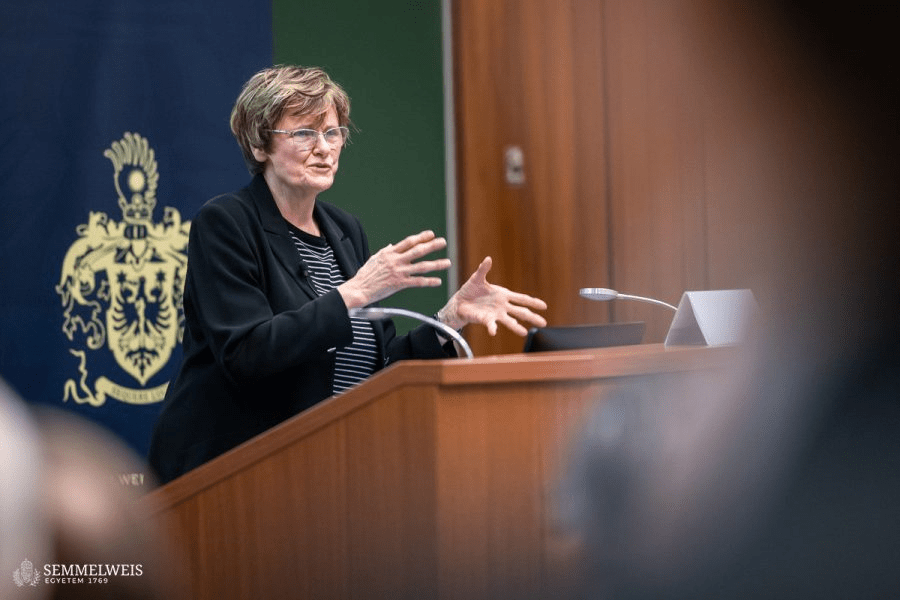
“Thanks to you, dear Katalin, it is an even greater source of joy and pride for us to be Hungarian doctors today,” said Dr. Béla Merkely, Rector, welcoming to the EOK the keynote speaker of the closing event of the Frigyes Korányi Scientific Forum, Dr. Katalin Karikó, the Nobel Prize-winning scientist who developed the mRNA vaccine. The rector stressed that Dr. Katalin Karikó saw mRNA technology as a new method of curing diseases at a time when hardly anyone had thought of it. She persisted with her ideas even when no one believed her. With unique tenacity and admirable perseverance, she kept working when she came up against difficulties. With her deep dedication and faith, she eventually saved millions of lives, and can save many more in the future, because it is thanks to her work that we were not left defenseless in the midst of the greatest pandemic in modern history, Dr. Béla Merkely emphasized. He also pointed out that the development by Dr. Katalin Karikó and Dr. Drew Weissman could in the future provide new solutions for the treatment of other widespread diseases as well, offering a promising perspective in the treatment of tumorous and other diseases.
Dr. Katalin Karikó, who is the worthy heir of the eponym of our university, one of the best-known Hungarian doctors of all time, believes that in achieving great results it is very important to be able to ‘pick yourself up and dust yourself off’ even after possible failures, to be able to overcome the difficulties that life has thrown at us. Her example gives us all strength and motivation to do so, and we now have a seminar room named after her in honor of her greatness and the values she stands for – the rector concluded his welcome address.
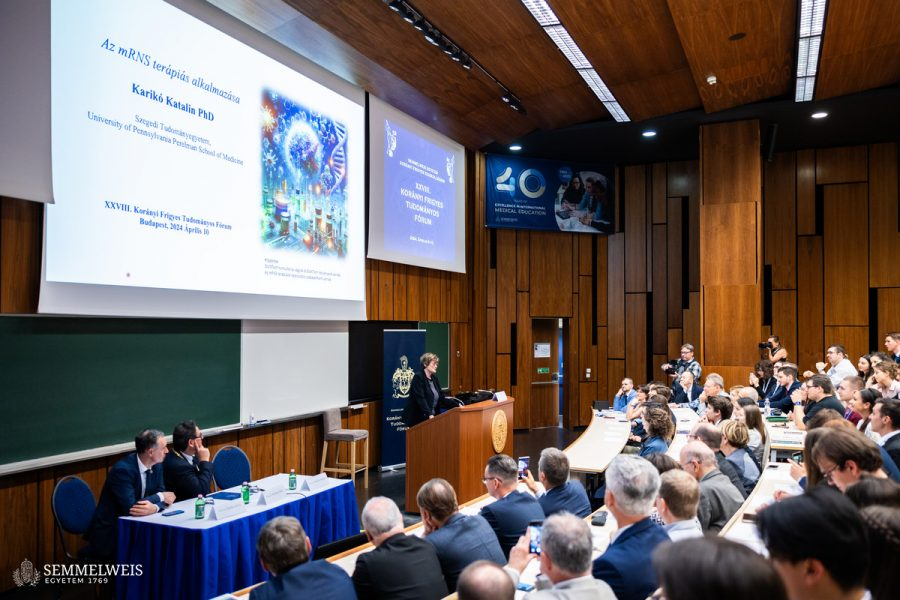
I never wanted to be a doctor, but I did want to be a researcher, and a teacher of mine in the small town of Kisújszállás convinced me that it was possible. My teacher’s encouragement meant a lot to me, everyone needs to have a supporter, Dr. Katalin Karikó began her presentation. She then went on to outline the time span from the discovery of mRNA in 1961 to the clinical testing of the vaccine in 2021. She stressed that it became clear towards the end of the process that it was not enough to have a promising discovery and to put it into practice; society also needed to accept it, therefore it was very important to inform people, which she and her colleagues realized when the vaccine was rejected by many, Dr. Katalin Karikó emphasized. Then she briefly recalled the main stages of her career, starting with the University of Szeged; the lipid laboratory of the Biological Research Centre, Szeged; and the town of Szarvas, where, although she wanted to conduct exciting lipid experiments, she had to spend a whole summer collecting water fleas at the instruction of the laboratory director.
As a researcher you do what you are assigned to do, and no matter where you are thrown and what task you get, whether it’s collecting water fleas or something else, you dig into it and you always learn something. That’s the point.
In the lab, she also worked with lipids and RNA, which had been found to be responsible for the interferon-induced antiviral effect a year earlier, in 1977. In describing the mechanism of action that inhibits viral replication, Dr. Katalin Karikó mentioned that the two enzymes that inhibit viral replication, oligoadenylate shyntase and RNase L, were also found during the COVID pandemic, and their levels that are genetically inherited were determined to be very low in patients with a severe coronavirus infection. The demonstration of antiviral activity in the Szeged laboratory was also successful, but after all their project was not further funded by Chinoin, so she continued her work in the lab of Professor Robert Suhadolnik in Philadelphia for the next three years. Suhadolnik also worked on 2’-5’-linked RNA molecules and nucleosides to develop antiviral applications and to cure AIDS. However, the molecule had not been successfully modified at that time. Later she produced messenger RNA in the laboratory of the University of Pennsylvania with cardiologist Dr. Elliot Barnathan, with whom she succeeded in developing the mRNA that encodes the receptor for urokinase. Dr. Katalin Karikó, speaking about working together with doctors, emphasized the importance of collaboration between doctors and researchers. We should strive to understand and respect each other, and learn from each other, she explained, noting that an innovation can also be born this way, not only when many researchers analyze a problem from different perspectives. She also later worked with neurosurgeon Dr. David Langer on making messenger RNA suitable for stroke treatment. Langer brought his clinical experience to the collaboration, while Dr. Katalin Karikó brought her laboratory experience.
In her talk, she said that she had met Dr. Drew Weissman, with whom she was awarded the Nobel Prize in 2023, by chance. Weissman wanted to develop a HIV vaccine, but he was also interested in Dr. Katalin Karikó’s work with mRNA. Together, they were researching how mRNA modifications could be used to prevent the development of inflammation. In addition to recalling the development process, she also talked about their joint company with Dr. Drew Weissman, which was set up for the therapeutic applications of the patent. She reminded the audience that in order to utilize a discovery or the outcome of research, the right framework must be created, and the process must be pursued as far as possible. In 2013 Dr. Katalin Karikó continued her career at BioNTech in Germany.
Speaking about messenger RNA, she pointed out that even before COVID, the molecule had been tested for rabies virus, avian influenza and cardiac applications, among others. Developments focused primarily on infectious diseases such as influenza and coronavirus, but human trials are also underway for Zika virus and herpes virus. More than 250 clinical trials are ongoing with in vitro engineered messenger RNA. Tests have started on bacteria: the TB bacterium and Borrelia, as well as the malaria parasite. One can also hear about tumor vaccines, with the antibody still present in the body 3 years later, which can greatly delay tumor recurrence. Clinical trials of mRNAs have already been carried out for acute diseases, genetic diseases, and cystic fibrosis, Dr. Katalin Karikó said, stressing that new results are being obtained every day, so we need to keep a constant eye on the progress and direction of mRNA research.
In addition to following scientific findings, the researcher also highlighted the importance of stress management, adding that in her view the most important thing was to work with joy.
Enjoy what you are doing and don’t focus on others, don’t compare yourself to others. If I had paid attention to how successful people around me were while I was just going downhill, I would have stopped doing research a long time ago.
Don’t do anything to please someone else, your boss or family member, instead you should work to make yourself happy, in this way you won’t be disappointed, the Nobel Prize-winning scientist advised the students. Do something that you don’t have to do but that brings you joy. Don’t try to please others, and believe in yourself, believe that you can achieve your goals through hard work and diligence, said Dr. Katalin Karikó, who also showed the audience her Nobel Prize.
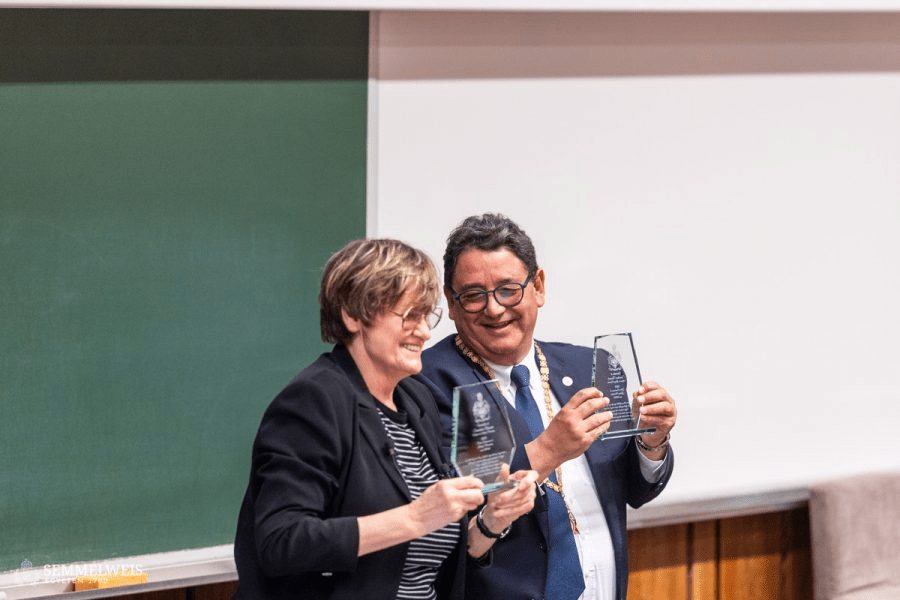
Answering questions at the end of her speech, she said that she never wanted to take revenge on those who had harmed her or hindered her work. In such situations she rather started thinking about how she could be grateful to them, because by making her life more difficult, they had made her better. Even later, as a respected scientist, she did not reproach those who had hindered her for anything because she believes that those who do bad things do not remember what they have done. Asked about how to reconcile being a researcher and having a family, she pointed out that being a researcher is not family-friendly and her daughter had to become independent very early on. But she believes that if children feel and see that their parents love them and work hard at the same time, they will be fine. She also said that she can save a lot of time by being organized. Besides mental stress management, she also does sports, running a marathon in four and a half hours at the age of 50.
Dr. Katalin Karikó was awarded the Nobel Prize in Physiology or Medicine in 2023, jointly with Dr. Drew Weissman. Their research enabled the development of an effective mRNA-based vaccine against COVID-19. Dr. Katalin Karikó was elected an honorary member of the Hungarian Academy of Sciences in 2022, and she gave her inaugural lecture in April this year. In December 2022, she received the Semmelweis Budapest Award, Semmelweis University’s most prestigious scientific award. Research on messenger RNA (mRNA) began in 1961 and was approved by the U.S. Food and Drug Administration (FDA) in 2020 as a clinical agent in the form of a vaccine against COVID-19. Over 60 years of research, the stability and effectiveness of mRNAs have been improved, so that – in addition to the coronavirus – the technology developed could now lead to breakthroughs in the treatment of cancer and many other diseases that are still incurable today.
Anita Szepesi
Translation: Dr. Balázs Csizmadia
Photos: Bálint Barta – Semmelweis University

Comments0
Please log in to see or add a comment
Suggested Articles


